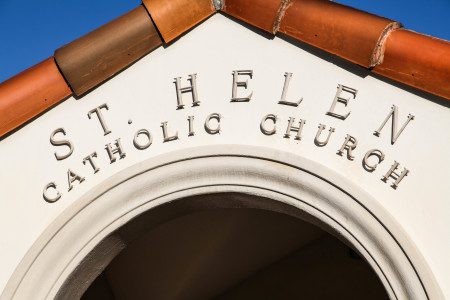Reading 1 Acts 4:8-12
“Leaders of the people and elders:
If we are being examined today
about a good deed done to a cripple,
namely, by what means he was saved,
then all of you and all the people of Israel should know
that it was in the name of Jesus Christ the Nazorean
whom you crucified, whom God raised from the dead;
in his name this man stands before you healed.
He is the stone rejected by you, the builders,
which has become the cornerstone.
There is no salvation through anyone else,
nor is there any other name under heaven
given to the human race by which we are to be saved.”
Responsorial Psalm Ps 118:1, 8-9, 21-23, 26, 28, 29
or:
R. Alleluia.
Give thanks to the LORD, for he is good,
for his mercy endures forever.
It is better to take refuge in the LORD
than to trust in man.
It is better to take refuge in the LORD
than to trust in princes.
R. The stone rejected by the builders has become the cornerstone.
or:
R. Alleluia.
I will give thanks to you, for you have answered me
and have been my savior.
The stone which the builders rejected
has become the cornerstone.
By the LORD has this been done;
it is wonderful in our eyes.
R. The stone rejected by the builders has become the cornerstone.
or:
R. Alleluia.
Blessed is he who comes in the name of the LORD;
we bless you from the house of the LORD.
I will give thanks to you, for you have answered me
and have been my savior.
Give thanks to the LORD, for he is good;
for his kindness endures forever.
R. The stone rejected by the builders has become the cornerstone.
or:
R. Alleluia.
Reading 2 1 Jn 3:1-2
See what love the Father has bestowed on us
that we may be called the children of God.
Yet so we are.
The reason the world does not know us
is that it did not know him.
Beloved, we are God’s children now;
what we shall be has not yet been revealed.
We do know that when it is revealed we shall be like him,
for we shall see him as he is.
Alleluia Jn 10:14
I am the good shepherd, says the Lord;
I know my sheep, and mine know me.
R. Alleluia, alleluia.
Gospel Jn 10:11-18
“I am the good shepherd.
A good shepherd lays down his life for the sheep.
A hired man, who is not a shepherd
and whose sheep are not his own,
sees a wolf coming and leaves the sheep and runs away,
and the wolf catches and scatters them.
This is because he works for pay and has no concern for the sheep.
I am the good shepherd,
and I know mine and mine know me,
just as the Father knows me and I know the Father;
and I will lay down my life for the sheep.
I have other sheep that do not belong to this fold.
These also I must lead, and they will hear my voice,
and there will be one flock, one shepherd.
This is why the Father loves me,
because I lay down my life in order to take it up again.
No one takes it from me, but I lay it down on my own.
I have power to lay it down, and power to take it up again.
This command I have received from my Father.”
– – –
Lectionary for Mass for Use in the Dioceses of the United States, second typical edition, Copyright © 2001, 1998, 1997, 1986, 1970 Confraternity of Christian Doctrine; Psalm refrain © 1968, 1981, 1997, International Committee on English in the Liturgy, Inc. All rights reserved. Neither this work nor any part of it may be reproduced, distributed, performed or displayed in any medium, including electronic or digital, without permission in writing from the copyright owner.


